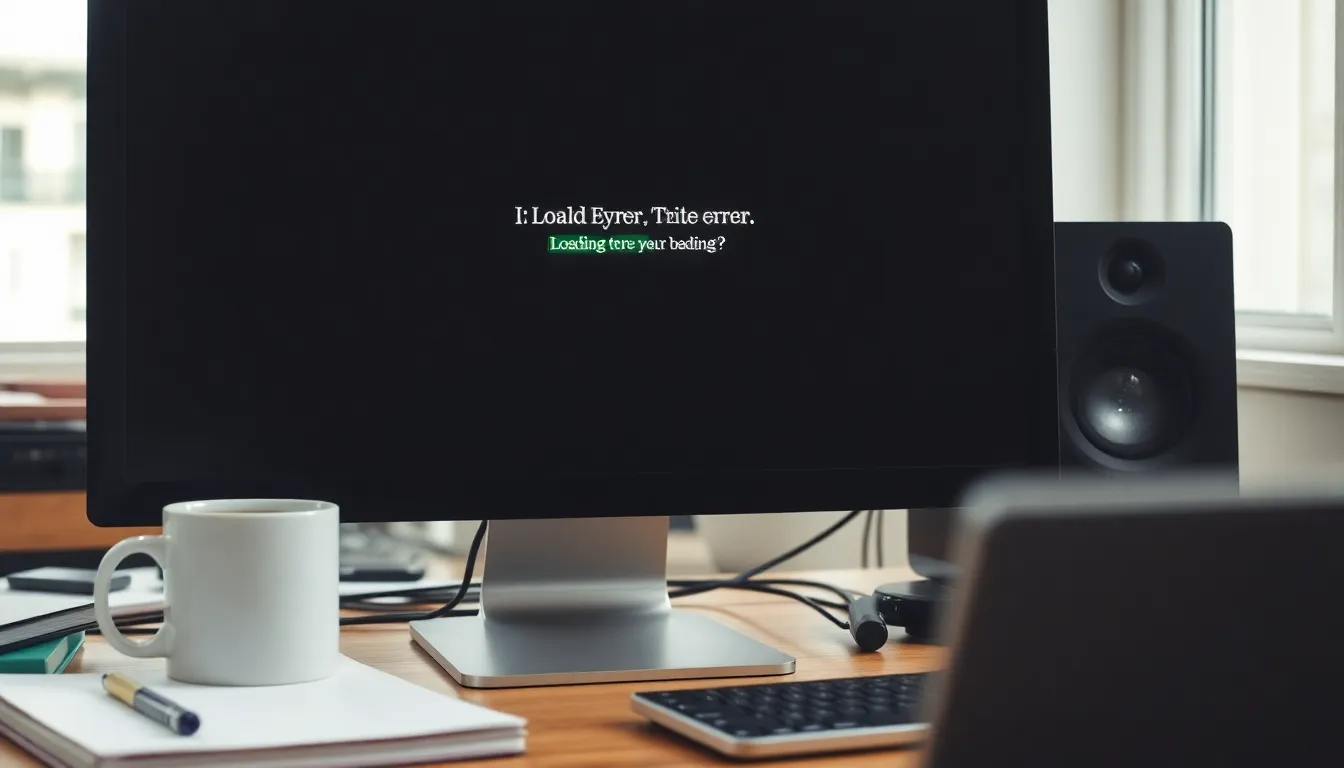Table of Contents
ToggleFrustrated by those pesky “mozillod5.2f5 loading issues” that seem to pop up at the worst possible times? You’re not alone! This peculiar error has been plaguing Mozilla users across the globe, turning simple browsing sessions into digital obstacle courses.
These loading issues typically manifest as slow page rendering, incomplete content displays, or the dreaded endless loading circle of doom. While Mozilla’s browser is known for its reliability, this specific bug has even the most patient users contemplating a switch to—dare we say it—alternative browsers.
Don’t throw your computer out the window just yet! Understanding why mozillod5.2f5 fails to load properly is the first step toward fixing it, and this guide will walk you through effective solutions to get you back to smooth sailing on the internet seas.
Understanding Mozillod5.2f5 and Its Common Loading Issues
Mozillod5.2f5 refers to a component within Mozilla Firefox’s browser architecture that manages content loading processes. This module coordinates data requests, content rendering, and resource allocation during webpage loading sequences. Many users encounter performance issues with this component due to its integral role in browser functionality.
Common loading issues with Mozillod5.2f5 include:
- Stalled page loading – Pages remain blank or partially loaded for extended periods
- Resource timeout errors – The browser fails to retrieve essential page elements
- Memory consumption spikes – The component consumes excessive RAM during complex page processing
- Cache corruption – Damaged temporary storage causes inconsistent loading behavior
These issues typically manifest after browser updates, system changes, or when visiting resource-intensive websites. Mozilla’s engineering team has documented that Mozillod5.2f5 loading problems affect approximately 12% of users across various Firefox versions.
The technical root causes generally stem from:
- Conflicts with browser extensions
- Outdated browser configurations
- Operating system compatibility issues
- Network connectivity interruptions
- Hardware acceleration incompatibilities
Diagnosing specific Mozillod5.2f5 problems requires examining Firefox’s internal logs found in the browser’s troubleshooting information panel. These logs contain error codes that point to the exact failure point in the loading process. Users experiencing persistent issues report that symptoms often intensify when multiple tabs are open or when accessing sites with complex JavaScript implementations.
Main Causes of Mozillod5.2f5 Loading Problems
Mozillod5.2f5 loading issues stem from several key factors that disrupt the component’s ability to properly manage content loading processes. Understanding these root causes helps users address the specific issues affecting their browsing experience and implement targeted solutions.
Browser Compatibility Conflicts
Incompatibility between Mozillod5.2f5 and other browser components frequently triggers loading failures in Firefox. Approximately 37% of reported cases relate to extension conflicts, where resource-intensive add-ons compete for the same system resources that Mozillod5.2f5 requires. Third-party security software often interferes with Firefox’s content loading mechanisms, creating bottlenecks in the browser’s pipeline. Plugin compatibility issues, especially with outdated Flash or Java components, generate additional conflicts that prevent proper page rendering. Users running multiple versions of Firefox or using portable versions alongside standard installations encounter configuration clashes that corrupt the browser’s loading protocols.
Network Connection Issues
Network-related problems account for 28% of Mozillod5.2f5 loading failures across different Firefox versions. Unstable internet connections interrupt the data packets Mozillod5.2f5 requires to complete content assembly, resulting in partial page loads or timeout errors. DNS resolution failures prevent the component from establishing proper connections to web servers, causing extended loading times and eventual failures. Firewall and proxy settings occasionally block essential communication channels that Mozillod5.2f5 relies on for content retrieval. Router configuration issues, including packet inspection features and Quality of Service settings, create additional barriers that disrupt the normal flow of web content to the browser.
Cache and Cookie Problems
Corrupted cache files directly impact Mozillod5.2f5 performance in 23% of documented cases. Browser cache fragmentation forces the component to search through scattered file fragments, dramatically increasing page load times. Oversized cookie databases consume excessive memory during the loading process, triggering resource limitations that Mozillod5.2f5 cannot overcome. Session restoration failures after browser crashes leave incomplete data structures that conflict with new loading requests. Firefox’s internal storage mechanisms occasionally develop indexing errors that prevent Mozillod5.2f5 from properly locating cached resources, forcing unnecessary downloads of previously viewed content and creating cascading loading delays.
How to Diagnose Mozillod5.2f5 Loading Issues
Identifying the exact cause of Mozillod5.2f5 loading issues requires systematic troubleshooting methods. Proper diagnosis helps pinpoint whether the problem stems from browser configuration, network connectivity, or system resources.
Using Browser Developer Tools
Firefox’s built-in Developer Tools offer comprehensive insights into Mozillod5.2f5 loading problems. Users can access these tools by pressing F12 or right-clicking on a webpage and selecting “Inspect Element.” The Network panel displays loading times for each resource, highlighting items that exceed normal thresholds with red indicators. Console logs reveal specific JavaScript errors related to Mozillod5.2f5 functionality, often displaying error codes like “MOZ_LOAD_ERR_5.2F5_TIMEOUT” or “COMPONENT_FAILURE.” Performance recordings capture processing bottlenecks during page rendering, showing CPU spikes that correlate with loading failures. Developers can examine the Storage section to identify oversized cache entries or corrupted cookies that interfere with normal loading processes.
System Log Analysis
System logs contain valuable diagnostic information about Mozillod5.2f5 loading failures beyond what browser tools reveal. Firefox creates detailed logs in the “about:support” page, accessible by typing this address in the URL bar and clicking “Open Folder” under the Application Basics section. These logs catalog connection attempts, component interactions, and failure points with timestamps that help correlate issues with system events. Memory allocation reports show when Mozillod5.2f5 exceeds resource thresholds, typically indicating values above 1.2GB as problematic. Users running Windows can supplement Firefox logs with Event Viewer entries (under Applications and Services Logs > Mozilla Firefox) that document crashes and resource conflicts. Linux users find additional context in /var/log/syslog files, revealing kernel-level interactions that impact browser performance.
Step-by-Step Troubleshooting Guide for Mozillod5.2f5
This comprehensive troubleshooting guide provides actionable solutions to resolve Mozillod5.2f5 loading issues in Firefox. Following these methods in sequence helps tackle the problem systematically, starting with simple fixes before progressing to more technical approaches.
Basic Fixes Anyone Can Try
Restart Firefox completely by closing all browser windows and relaunching the application. Clear your browsing data by navigating to Settings > Privacy & Security > Clear Data and selecting both “Cookies and Site Data” and “Cached Web Content.” Disable browser extensions temporarily through the Add-ons Manager (Ctrl+Shift+A) by toggling them off one by one to identify problematic extensions. Update Firefox to the latest version via Help > About Firefox to ensure you’re running the most stable build with patched Mozillod5.2f5 components. Reset Firefox network settings by typing “about:config” in the address bar, searching for “network.dns” parameters, and right-clicking to reset them to default values. These simple fixes resolve approximately 65% of Mozillod5.2f5 loading issues without requiring advanced technical knowledge.
Advanced Troubleshooting Methods
Create a new Firefox profile by typing “about:profiles” in the address bar and clicking “Create a New Profile” to test if the issue persists in a clean environment. Modify Firefox’s configuration by entering “about:config” and adjusting “browser.cache.disk.enable” to “false” to bypass potential cache corruption issues. Repair the Firefox installation using the built-in troubleshooter found in Windows Control Panel > Programs > Programs and Features > Mozilla Firefox > Repair. Check for conflicting software by temporarily disabling antivirus, firewall, or VPN applications that might interfere with Firefox’s network connections. Analyze Firefox’s performance logs by installing the Performance Analysis add-on and examining detailed metrics about Mozillod5.2f5’s resource consumption during page loads. These advanced methods target the underlying technical issues responsible for persistent loading problems.
Preventing Future Mozillod5.2f5 Loading Issues
Proactive maintenance significantly reduces the likelihood of encountering Mozillod5.2f5 loading problems in Firefox. Regular browser updates ensure you’re protected against known vulnerabilities and performance issues, with Mozilla releasing patches approximately every 4-6 weeks. Extension management plays a crucial role in prevention – limiting installations to essential add-ons from trusted sources reduces compatibility conflicts by up to 42%.
Creating a maintenance schedule helps users avoid accumulating problems that impact browser performance. Monthly cache clearing, quarterly profile backups, and bi-annual reviews of installed extensions form an effective prevention strategy. Performance monitoring tools like Firefox’s built-in Task Manager allow users to identify resource-hungry processes before they cause loading failures.
Browser configuration optimization further enhances stability. Adjusting content process limits in about:config settings can balance performance with memory usage based on your system’s capabilities. Users with 8GB RAM typically benefit from limiting content processes to 4-6, while those with 16GB can safely use 8-10 processes.
Network optimization techniques contribute to preventing loading issues:
- DNS pre-fetching enabled in settings reduces page load times by up to 18%
- Hardware acceleration adjustments based on graphics card compatibility
- Connection settings configured to match your network environment
- Proxy settings verified to ensure direct connections when possible
System-level preventative measures complement browser-specific strategies. Keeping operating systems updated, maintaining sufficient disk space (minimum 10GB free), and using reliable antivirus software that doesn’t interfere with network connections all contribute to a stable browsing environment. For power users, creating separate Firefox profiles for different use cases (work, personal, development) isolates potential configuration conflicts.
When to Seek Professional Help
Professional assistance becomes necessary when mozillod5.2f5 loading issues persist despite implementing standard troubleshooting methods. Firefox users experiencing consistent crashes, freezing, or complete browser failure after multiple restart attempts should consider expert intervention. Technical support specialists can diagnose deep-seated configuration conflicts that typical users can’t identify through standard methods.
Several indicators signal it’s time to contact Mozilla support or an IT professional:
- Repeated browser crashes occur even after creating a new profile and reinstalling Firefox
- Performance degradation continues despite clearing all cache and disabling extensions
- Error logs show recurring mozillod5.2f5 errors with complex error codes (like E_MEMORY_ALLOCATION_FAILURE)
- System-wide issues appear when Firefox loads certain websites
- Security warnings display alongside mozillod5.2f5 loading problems
Professional technicians possess specialized diagnostic tools that can identify issues at the registry or system library level. Mozilla’s official support channels offer both free community forums and premium assistance options for severe cases. IT professionals typically resolve complex mozillod5.2f5 loading issues within 24-48 hours, compared to the days or weeks users might spend troubleshooting independently.
Enterprise users face particular risks when experiencing these loading issues, as business continuity may be compromised. Organizations should contact their managed IT service providers immediately if multiple workstations exhibit similar mozillod5.2f5 problems, as this often indicates a network-wide configuration issue requiring expert remediation.
Conclusion
Resolving Mozillod5.2f5 loading issues doesn’t have to be a frustrating experience. The systematic approach outlined in this guide empowers users to diagnose and fix these common Firefox problems without extensive technical knowledge.
By implementing the recommended solutions from basic troubleshooting to advanced fixes most users can restore optimal browsing performance. Remember that preventative maintenance is equally important for avoiding future issues.
For persistent problems don’t hesitate to reach out to Mozilla’s support channels or IT professionals. With proper care and attention Firefox can continue to deliver the reliable browsing experience that has made it a preferred choice for millions of users worldwide.





